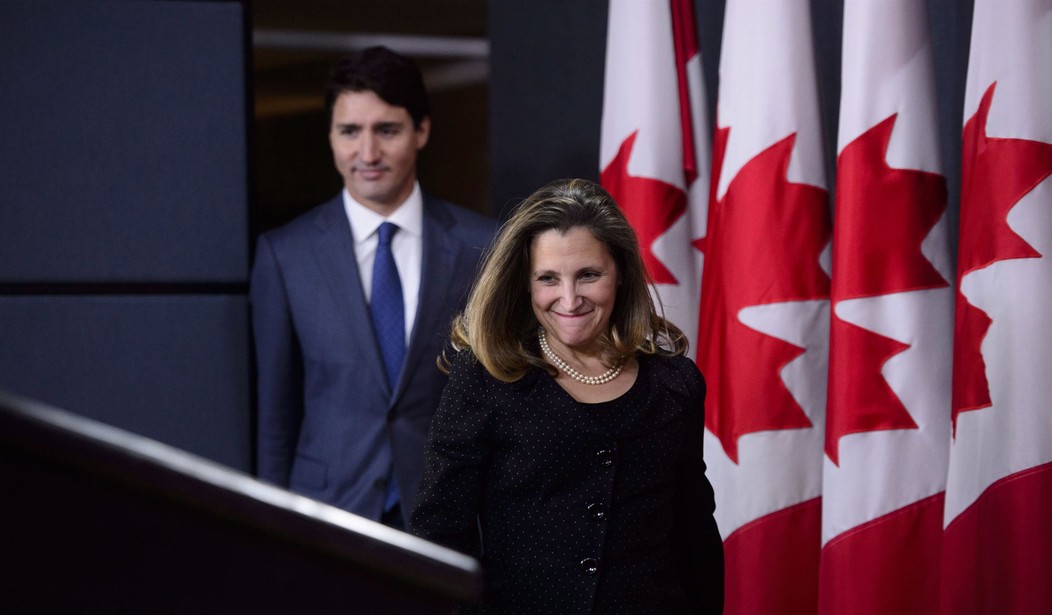According to Prime Minister Justin Trudeau and his chief accountant Chrystia Freeland, runaway inflation and the recession it announces are something of a godsend. Price increases, she said in a recent address, are “a reminder of why climate action is so important, and why we have to work…faster towards a green economy.” The benefits, according to this authority, are clear: More green energy, lower prices. The claim is so fatuous as to induce intellectual migraine.
Over the last few hours, I have been reviewing our last week’s expenditures and current financial status, and I find the red column expanding faster than Freeland’s race to Green:
- Our investments for the future have plunged by 15%.
- Filling up our Ford SUV cost $120.
- Two moderate shopping trips to our local Safeway set me back $290.
- An order of take-out, which only recently cost $12.95, was now $17.95. (The owner of the establishment worried that she might not be able to stay open much longer.)
- A small cache of pharmaceuticals and hygienic products totaled $170.
Add to the catalogue the almost magical levitation of taxes on everything in sight, including the compounding carbon tax that is putting our farmers out to scrannel, and we have before us the specter of economic collapse. There’s more, of course, and readers will have similar lists. No need to belabor; we are speaking the same language. I guess we should thank our lucky stars that there is still gas in the pumps and a dwindling supply of food on the shelves that will allow us to experience the joys of imminent bankruptcy. But all is not lost. The solution for the gas hikes, according to the premier of my home province of British Columbia, John Horgan, is beautifully simple: “Think before you hop in the car.”
Justin Trudeau comes from endowment money and Chrystia Freeland is flush with perks, a lavish six-figure salary, automatic raises, and a gold-clad retirement portfolio. Their limousines and jets drink greedily and cost-free from the public trough. But we should remember that they are laboring to save the planet. Hard-working public evangelists surely merit their emoluments. Moreover, their fiscal measures are a small price to pay, apparently, for so glorious an expeditionary adventure into the looming future, regardless of collateral damage.
These people are not only mad but wholly disingenuous. They remind me of Bill Gates, who stresses that we must reduce our carbon, methane, and nitrogen imprint and accustom ourselves to eating bugs for dinner, though he himself will feast on fillet mignon washed down with a bottle of Amarone. The tables of Trudeau, Freeland, and their cronies in politics and banking will be similarly furnished while we sample the culinary delight of centipedes and grasshoppers.
Canada strikes me as at least partly reminiscent of 1789 France, just prior to the revolution whose malign effects are still with us. The Third Estate — the common folk — was crushed by prohibitive taxes on income, property, land, crops, livestock, comestibles, tobacco, alcohol, and whatever else the regime could drain from its subjects. (“They even paid for the privilege of having been born,” writes Emma Moreau in The French Revolution — though we are not quite there yet). The national debt grew astronomically and interest rates on the debt kept pace. The Austrian-born Queen, Marie Antoinette, was dubbed Madame Deficit.
Louis XVI, “who had neither the personality nor the intelligence to rule,” Moreau remarks, cared nothing for his commoners. No matter. The political, clerical, and financial royalty lived in luxury, enjoying power and wealth, frittering away their days in scandal and intrigue. The king issued decrees right and left, often during prorogued parlements. Legitimate protests were ruthlessly put down. The correspondence with our own potentates and dynasts, whose sense of entitlement and opulent lifestyles have a Bourbon cachet, is rather stunning.
Canadians have not yet reached the equilibrium profile of the pre-revolutionary French rabble, but following the economic devastation wrought by the unprecedented stupidity of official COVID-19 policy and the utterly reckless monetary agenda of the Trudeau administration, we may be gradually approaching the inflection point, as more people begin to feel the pinch, the bite, and the eventual rending. A Party revolt, as in the U.K., would be welcome, if unlikely. The Liberal cabinet is made of the same stuff as the prime minister. A national uprising of the productive class, as in Holland, would serve the purpose — again unlikely, considering that the Trucker Convoy that descended on Ottawa was supported neither by the unions nor the majority of fellow truckers.
The U.S. is approaching its Congressional midterms when the devastating prospect of economic implosion may be rectified. But we have three welded years until the next election with no assurance that anything like a recognizable Canada will even exist by that time. The majority of Canadians are not renowned for revolutionary indignation, civil disobedience, or political insight. They are not particularly interested in the preservation of democratic principles or civil liberties. But when people can no longer afford to heat their homes, fuel their vehicles, feed their families, and run their businesses, perhaps even so tame and fearful a nation will say enough is enough.
As Robert Tucker writes in The Soviet Political Mind, we observe the criteria of the totalitarian regime operating “under single-party auspices” — just as, for all intents and purposes, we now do in this country. At the same time, he continues, “within the continuity…of enduring patterns of thought, politics and organization…we find the inexorable law of change at work.” Canada is not revolutionary France or Soviet Russia, but the “inexorable law of change” may still be “at work.” If fiduciary sanity is not restored, some sort of reckoning may be on the horizon.










Join the conversation as a VIP Member